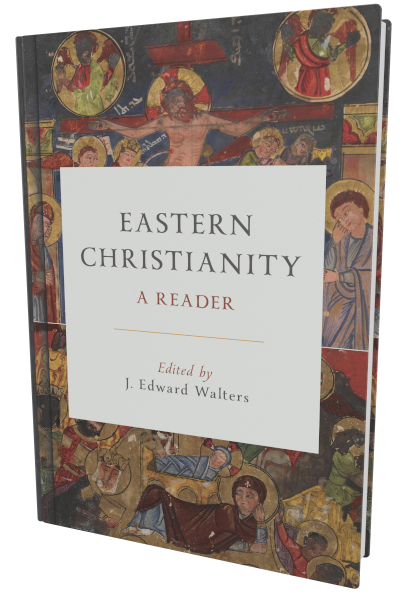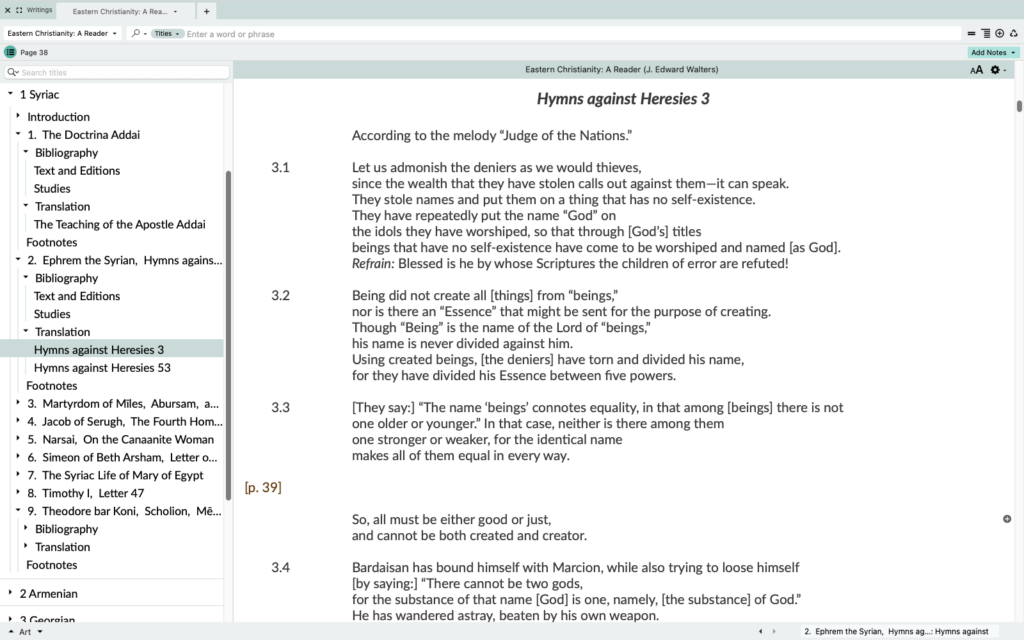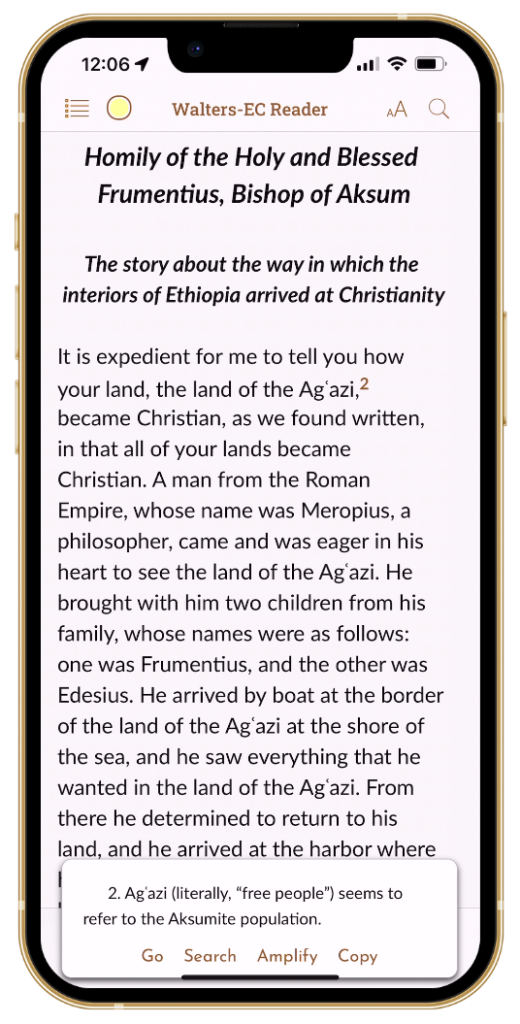
Most collections of church writings from Eastern voices focus on sources from the Patristic period and/or Byzantine Christianity. That is, most of the time, translations are offered of sources originally written in Greek. In the recent volume from Eerdmans Publishing, Eastern Christianity: A Reader, edited by J. Edward Walters, and newly released for the Accordance Library, we get to hear from non-Greek Eastern sources.
Specifically, Walters gives us selections from Syriac, Armenian, Georgian, Arabic, Coptic, and Ethiopic Christian traditions. Moreover, most of these texts originate from non-Chalcedonian Orthodox Churches,* though many figures mentioned in these selections—such as St. Ephrem the Syrian, St. Mary of Egypt, and St. George among others—are embraced by almost all expressions of Eastern Orthodox Christianity.
Eastern Christianity: A Reader is exactly what the title says: these are short selections and excerpts that give the reader a “taste” of much larger bodies of literature. Some selections are complete within themselves and some are excerpts from much larger works. Each tradition and selection is given introductions and bibliographies so that those who are interested in further study can do so.

Most of the selections in this volume are appearing for the first time in English. They span an era from roughly the third through the 15th century AD. Since many of these selections are written by and about individuals foreign to most Western readers, I have created the list of readings below with hyperlinks to Wikipedia, Orthodox Wiki, and other sources. Hopefully, this will offer a quick source of “more information” if you have purchased or are considering this work.
Syriac
- The Doctrina Addai
- Ephrem the Syrian, Hymns against Heresies 3 and 53
- Martyrdom of Mīles, Abursam, and Sinay
- Jacob of Serugh, The Fourth Homily on Cain and Abel
- Narsai, On the Canaanite Woman
- Simeon of Beth Arsham, Letter on the Ḥimyarite Martyrs
- The Syriac Life of Mary of Egypt
- Timothy I, Letter 47
- Theodore bar Koni, Scholion, Mēmrā 10
Armenian
- Koriwn, The Life of Mashtotsʿ
- Eznik of Koghb, Refutation of the Sects (or, On God)
- The Teaching of Saint Grigor
- Anania of Narek, On This Transitory World
- Grigor of Narek, Book of Lamentation, Discourse 1, Discourse 88
- Nersēs Shnorhali, Hymn for the Sunrise Hour, Instructional Preface to a Prayer of Nersēs, Prayer of Nersēs
Georgian
- Jacob Cʿurtaveli, Martyrdom of Saint Shushanik
- John Sabanisże, Martyrdom of Habo, the Perfumer from Baghdad
- George the Athonite, The Lives of John the Iberian and Euthymios the Athonite, and George the Minor, The Life of George the Athonite
- Mark the Deacon, The Life of Porphyry of Gaza
Arabic
- Homilies on the Gospel Readings for Holy Week
- Theodore Abū Qurrah, That God Is Not Weak
- The Disputation of Abraham of Tiberias
- Ḥunayn Ibn Isḥāq, How to Discern the True Religion
- Miracles of Saint George
- Commentary on the Pentateuch
Coptic

- Life of Pachomius
- Shenoute of Atripe, I Have Been Reading the Holy Gospels
- Pseudo-Dioscorus of Alexandria, Encomium on Macarius of Tkōou
- The Anaphora of Saint Thomas the Apostle
- Christophoria, Letter to the Comes Mena
- John of Paralos, Homily on the Archangel Michael and the Blasphemous Books of the Heretics
- Pseudo-Cyril of Alexandria, Encomium Interpreting Part of the Apocalypse of John the Apostle of Christ Jesus
Ethiopic
- Select Inscriptions of ʿEzana
- Homily on Frumentius
- Synaxarion on Yared
- Glory of the Kings (Kəbrä Nägäśt)
- Miracles of Mary
- Zärʾa Yaʿəqob, Book of the Trinity
- Prayer Amulet: MS Duke Ethiopic 15
I’ve always loved readers of any kind, but especially those that contain ancient texts, such as the ones above. In many ways, this volume represents a “deep cut” of Eastern Christian voices that are often overlooked, even in other volumes of Eastern content. This volume will surely help round out your personal Accordance Library with the voices of these faithful witnesses that are often ignored by other histories and collections of writings.
From a historical perspective, many of these writings offer fascinating insights into Early Christianity’s response to other religions such as Islam and Zoroastrianism.
Our developers have carefully analyzed the content in Walters’ Eastern Christianity: A Reader and tagged content based on the following categories: Titles, English Content, Scripture, Greek Content, Transliteration, Syrian Content, Translation, Bibliography, Authors, and Page Numbers. This attention to detail separates this Accordance module from other digital platforms and allows the user to find specific content quickly and efficiently.
Eastern Christianity: A Reader, edited by J. Edward Walters, may be purchased at introductory discount for a limited time.
Reg Price $51.90; Sale Price $24.90 | Buy Now
*An overly-simplified explanation with links for further information: In the 5th century, new heresies arose regarding the nature of Christ. Two Ecumenical Councils were convened to address these issues, one in Ephesus and a later one in Chalcedon. A significant minority of Eastern churches rejected the resolutions at Chalcedon and make up the group of churches referred to earlier as “Non-Chalcedonian Orthodox Churches.” Traditionally, these minority Eastern churches have been referred to as “Oriental Orthodox,” although that designation has come into disfavor in recent years. Walters simply uses the phrase, “Eastern Christian,” though this is admitedly confusing in and of itself.
Some of the issues that led to the division over the 4th Ecumenical Council in Chalcedon may have partially resulted from misunderstandings caused by the differences in language that the groups in Walters’ Reader represent. Beginning in the 20th century and ongoing to today, there have been numerous positive dialogs between representatives of the larger Eastern Orthodox community and “Oriental” Orthodox Churches. There is much hope for these groups to come into communion with one another again, after a 1500-year schism.
For more information on the groups represented in Walters’ Eastern Christianity: A Reader, see the article on “Oriental Orthodox Churches” by Günter Büschges in the The Encyclopedia of Christianity. Of related interest, see “Orthodox Christianity” by John Meyendorff and “Orthodox Church” by Anastasios Kallis in the same volume.

